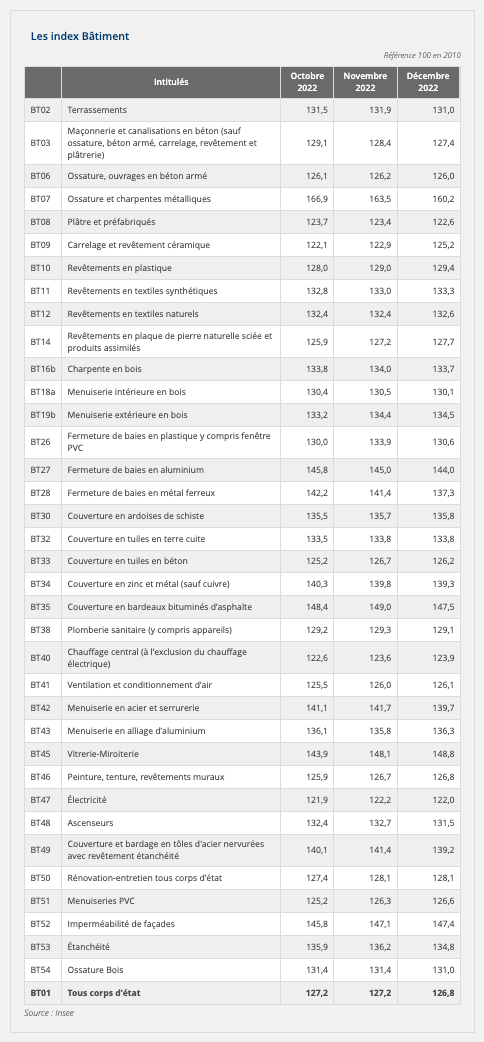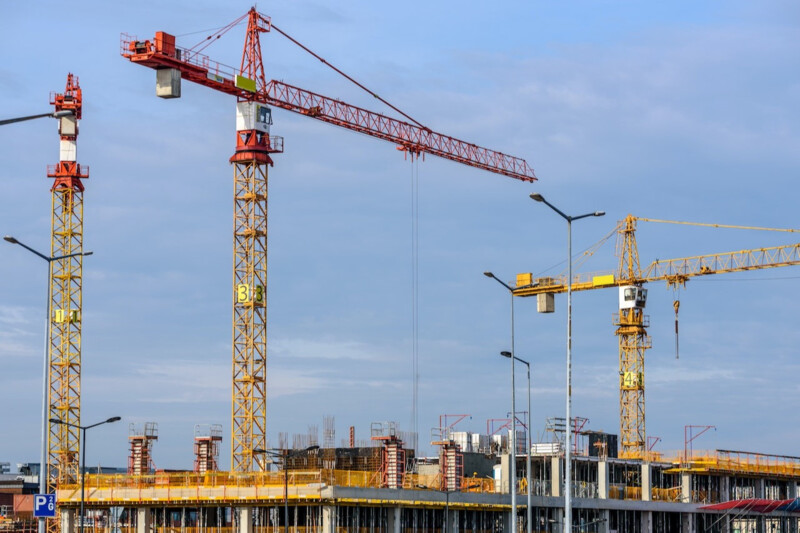La hausse des prix de l’énergie et des matériaux a provoqué, au cours des deux dernières années, une flambée des coûts de production dans le BTP. Selon les dernières données de l’Insee, une légère décrue, amorcée il y a plusieurs mois, s’est poursuivie fin 2022, mais les prix devraient rester élevés dans la construction en 2023.
Bâtiment : une hausse qui se maintient entre 6 et 7 % au dernier trimestre 2022
D’après les index de l’Insee pour le bâtiment et les travaux publics portant sur le 4ème trimestre 2022, la hausse des coûts de production dans la construction, en recul depuis l’été dernier, a continué à marquer le pas à la fin de l’année passée.
L’index du bâtiment tous corps d'état confondus (BT01) s’établissait à 127,9 en août 2022 (par rapport à une base de 100 en 2010), et s’est replié à 126,8 au mois de décembre. Dans le secteur des travaux publics, l’index général tous travaux (TP01) a reculé à 126,5 en décembre, après avoir atteint son niveau le plus élevé en juin-juillet 2022, à 129,1.
Malgré une relative stabilisation des prix, la forte hausse des 2 dernières années n’est pas effacée, et avoisinait encore 6 à 7 % au dernier trimestre 2022 pour le bâtiment. La décrue s’explique par un léger recul des prix des produits pétroliers et de l’acier.
Si la baisse des prix des produits pétroliers profite davantage au secteur des travaux publics, la hausse des prix de l’énergie et des matériaux, de même que le coût de la main-d’œuvre, pèsent encore sur le secteur du bâtiment.
Des coûts de production toujours élevés en 2023
Toutes les activités de la construction ne bénéficient pas de la même façon de la stabilisation des coûts de production. Certaines sont victimes d’une inflation encore plus forte, comme les travaux de carrelage et revêtement céramique, dont l’index a progressé de 11 points sur un an pour s’établir à 125,2 en décembre. L’index de la menuiserie PVC a progressé de 12,1 points, atteignant un record à 126,6, tandis que celui de la vitrerie-miroiterie a bondi de 21,3 points (148,8 en décembre).

Selon les spécialistes de l’Insee, la tendance de la stabilisation des prix à un niveau élevé devrait se poursuivre en 2023. La hausse des prix de l’électricité et des matériaux a été si forte au cours des deux années passées qu’aucune baisse conséquente n’est attendue dans les mois à venir.
La Fédération française du bâtiment (FFB) estime quant à elle que la revalorisation des salaires pèsera davantage sur le secteur cette année que l’année dernière, atténuant l’effet de la stabilisation des prix des matériaux.
La situation aura une incidence sur l'indice du coût de la construction (ICC), qui avait déjà augmenté sur un an de 6,92 % au premier trimestre 2022 et de 8 % sur les deux trimestres suivants. Les chiffres du quatrième trimestre seront connus fin mars.
